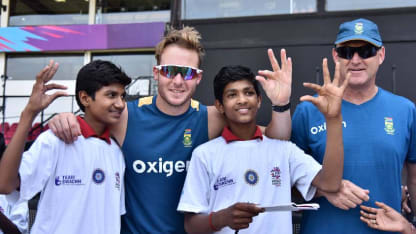ICC | About ICC
Cricket for Good
At ICC World Twenty20 India 2016
In a unique and remarkable CSR initiative under the aegis of ICC Cricket For Good and Team Swachh, players from the 16 participating ICC World Twenty20 India 2016 men’s and women teams engaged with children and adolescents to highlight the importance of hygiene and sanitation.
Cricketers from 16 teams joined forces to promote messages on health, sanitation and hygiene as part of the innovative Team Swachh campaign through specially designed Team Swachh cricket clinics set up at the various stadia.
Team Swachh is the first in a series of collaborations between the ICC Cricket For Good, UNICEF and the Board of Control for Cricket in India (BCCI) with the aim of leveraging the vast reach, appeal and immense power of cricket. This visionary collaboration aims to build a social movement for sanitation and toilet use, thereby leading to an open-defecation free India.
The initial focus of the collaboration in India is to improve sanitation. With the largest number of people--more than 595 million--still defecating in the open, poor sanitation can cause diarrhoea. This accounts for 9 per cent of the 1.2 million under-five deaths each year in the country.

South Africa's David Miller promoting messages on health, sanitation and hygiene
Emphasising the need for team play, UNICEF Goodwill Ambassador Sachin Tendulkar, said that ending open defecation and achieving sanitation for all in India takes a genuine team effort in which all relevant actors–from the Government to the people practicing open defecation, from role models to international development partners--play together as one team.
Disadvantaged children from local NGOs in the host cities joined Team Swachh and got an opportunity to meet local heroes like Yuvaraj Singh, Venkatesh Prasad, Umesh Yadav, Dinesh Karthik, Manoj Tiwari, Rishi Dhawan, Gurpreet Singh Mann, Pawan Negi, Sameer Dighe, Mithali Raj, Jhulan Goswami, Shubhlakshmi Sharma and Diana Edulji. They got themselves photographed with ICC WT20 Men’s and Women trophies on the Nissan Trophy Tour float that travelled more than 3,000 km- through the eight host cites.These prominent cricketers demonstrated handwashing, played cricket and toilet-based cricket games, reaching out to urban and rural populations with basic hygiene messages.